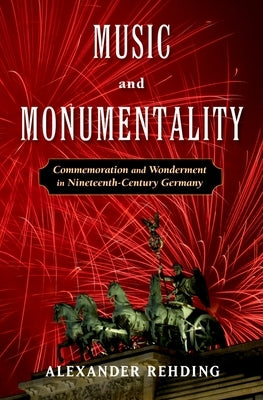Oxford University Press, USA
Music and Monumentality: Commemoration and Wonderment in Nineteenth Century Germany
Music and Monumentality: Commemoration and Wonderment in Nineteenth Century Germany
Regular price
$78.00 USD
Regular price
Sale price
$78.00 USD
Unit price
per
Shipping calculated at checkout.
Couldn't load pickup availability
A few weeks after the reunification of Germany, Leonard Bernstein raised his baton above the ruins of the Berlin Wall and conducted a special arrangement of Beethoven's Ninth Symphony. The central statement of the work, that all men will be brothers, captured the sentiment of those who saw a brighter future for the newly reunited nation. This now-iconic performance is a palpable example of musical monumentality - a significant concept which underlies our cultural and ideological understanding of Western art music since the nineteenth-century. Although the concept was first raised in the earliest years of musicological study in the 1930s, a satisfying exploration of the monumental in music has not yet been made. Alexander Rehding, one of the brightest young stars in the field, takes on the task in Music and Monumentality, an elegant, thorough treatment that will serve as a foundation for all future discussion in this area.
Rehding sets his focus on the main players of the period within the Austro-German repertoire -Beethoven, Liszt, Wagner, Brahms, Bruckner and Mahler- as he unpacks a two-fold definition of musical monumentality. In the conventional sense, monumentality is a stylistic property often described as 'grand, ' 'uplifting, ' and 'sublime' and rife with overpowering brass chorales, sparkling string tremolos, triumphant fanfares, and glorious thematic returns. Yet Rehding sees the monumental in music performing a cultural task as well: it is employed in the service of establishing national identity. Through a clear theoretical lens, Rehding examines how grand sound effects are strategically employed with the view to overwhelming audiences, how supposedly immutable musical halls of fame change over time, how challenging musical works are domesticated, how the highest cultural achievements are presented in immediately consumable form-in a word, how German music emerges as a unified cultural and musical brand.
Author: Alexander Rehding
Publisher: Oxford University Press, USA
Published: 08/19/2009
Pages: 320
Binding Type: Hardcover
Weight: 1.30lbs
Size: 9.30h x 6.40w x 1.00d
ISBN: 9780195385380
Review Citation(s):
Choice 03/01/2010
Rehding sets his focus on the main players of the period within the Austro-German repertoire -Beethoven, Liszt, Wagner, Brahms, Bruckner and Mahler- as he unpacks a two-fold definition of musical monumentality. In the conventional sense, monumentality is a stylistic property often described as 'grand, ' 'uplifting, ' and 'sublime' and rife with overpowering brass chorales, sparkling string tremolos, triumphant fanfares, and glorious thematic returns. Yet Rehding sees the monumental in music performing a cultural task as well: it is employed in the service of establishing national identity. Through a clear theoretical lens, Rehding examines how grand sound effects are strategically employed with the view to overwhelming audiences, how supposedly immutable musical halls of fame change over time, how challenging musical works are domesticated, how the highest cultural achievements are presented in immediately consumable form-in a word, how German music emerges as a unified cultural and musical brand.
Author: Alexander Rehding
Publisher: Oxford University Press, USA
Published: 08/19/2009
Pages: 320
Binding Type: Hardcover
Weight: 1.30lbs
Size: 9.30h x 6.40w x 1.00d
ISBN: 9780195385380
Review Citation(s):
Choice 03/01/2010
About the Author
Alexander Rehding is Professor of Music at Harvard University and co-editor of Acta musicological. His research specializes in nineteenth and twentieth century music and in the history of music theory. He is the author of Hugo Riemann and the Birth of Modern Musical Thought (Cambridge University Press, 2003).
This title is not returnable


